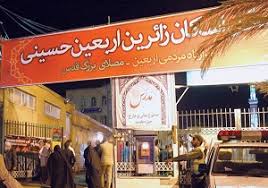
RNA – Every year, millions of sincere lovers of Imam al-Husayn travel to his holy shrine in the holy Iraqi city of Karbala for the Arba’in pilgrimage. News and reports of the reception of the Iraqi people for the pilgrims of Imam al-Husayn during the days of Arba’in have been published in various news agencies. But it is also a fact that the people of Qom also enjoy receiving the pilgrims and the people of this city have welcomed the pilgrims visiting from different countries in the city’s Musalla (Prayer Hall).
According to Mr. Allahyari, the executive director of the international section of the welcoming committee for the Arba’in pilgrims in Qom, said, “This year, pilgrims from various countries such as Azerbaijan, Turkey, Pakistan and Afghanistan have come to Qom before heading to Karbala, and they have been the guests of Lady Fatimah al-Ma’sumah.”
The Musalla of Qom has taken on the current climate and atmosphere of Karbala. Just as on the roads leading to Karbala, various booths have been established to meet the needs of the pilgrims which give out free food, tea and even repair the pilgrims’ shoes.
According to Mr. Allahyari, since the largest number of Arba’in pilgrims present in Qom are Pakistani Shi’ahs, a booth for the preparation of Pakistani food has been established in the Musalla and its cooks are Pakistani seminarians from al-Mustafa International University.
Alongside the Iranians who are volunteering to serve the pilgrims, including the Basij volunteer forces, many non-Iranian seminarians are also serving the pilgrims in the Musalla. The sincere Pakistani and Afghani seminarians in Qom constitute the largest number of non-Iranian servants and there are also two Russian seminarians serving the pilgrims as well – Rasim and Ismail, who converted to Islam and are now students of al-Mustafa International University.
Ismail stated that when Arba’īn is spoken of, perhaps the first thing to come to mind is the large number of pilgrims, which is a matter that is censored in the Western media and said, “Since the Western media censors the huge number of those participating in the pilgrimage, Western audiences cannot understand the purpose of such a massive gathering and because Islam has only been introduced to them through Daesh, the Western media censors any news about Arba’in.”
Rasim also said that murder and killing news are more appealing to Western audiences but news about religious events is unattractive to them.
Ismail noted that on the path toward Karbala, there are people who, despite being destitute, sacrifice all their belongings to receive the pilgrims and added, “This is due to the culture of generosity and sacrifice of Shi’ism, as well as the love of the Ahlul-Bayt. Shi’ahs have been nurtured in this culture from the time they were children to sacrifice themselves and help each other.”
In regard to the relation between the Arba’in pilgrimage and the advent of Imam al-Mahdi, Ismail said, “In a hadith, it’s said the reappearance of Imam al-Mahdi is dependent on the readiness of the people. The Arba’in pilgrimage is one of the signs of the readiness of the people for reappearance of Imam al-Mahdi. When people are ready for this pilgrimage, they will be ready to gain knowledge about the Imam al-Mahdi and his reappearance. Thus, God-willing, the reappearance is near.”
Ismail added that followers of other religions and denominations also participate in the Arba’in pilgrimage, including Sunnis and even Christians and said, “This pilgrimage is a demonstration of love, something that is spoken about in Christianity, but is less seen in the West today.”
Rasa News Agency
112/914